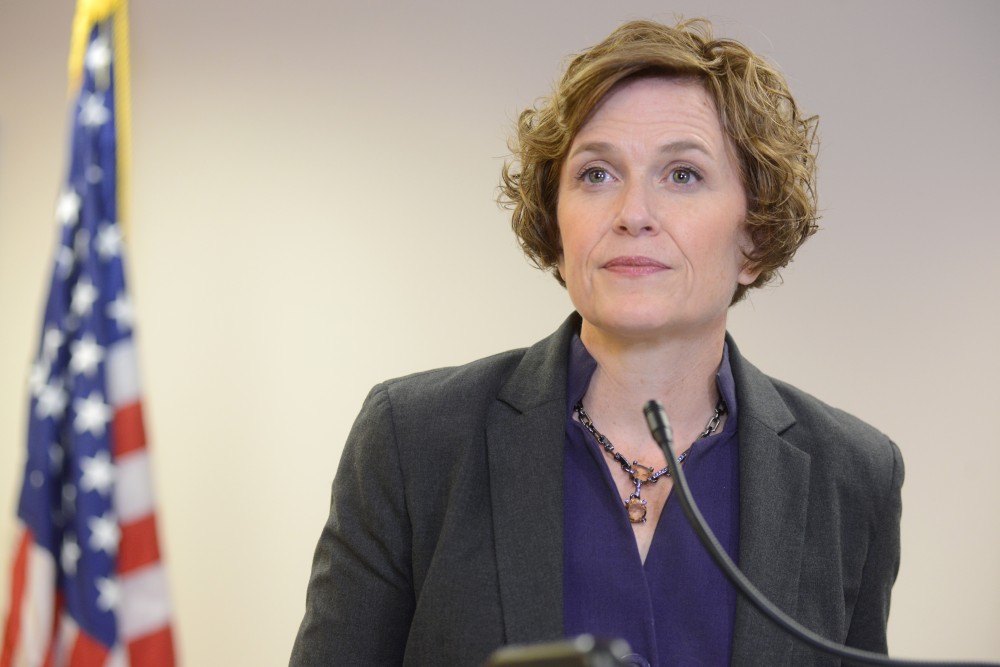Former Minneapolis Police Chief Janeé Harteau’s resignation on Friday altered the landscape of the November mayoral election.
The same day, Mayor Betsy Hodges held a press conference on the resignation, which Hodges requested after MPD Officer Mohamed Noor’s fatal shooting of Justine Damond, and announced the appointment of Assistant Chief Medaria “Rondo” Arradondo as the new interim Police Chief.
Damond’s death heightened an already tense MPD-community relationship and was highlighted when protesters disrupted the press conference, calling for Hodges’ own resignation.
“We have a crisis of confidence in the mayor’s office and our police department right now and this was necessary to regain public trust,” mayoral candidate and city council member Jacob Frey previously told the Minnesota Daily Friday.
The police-community relationship has been an embattled one which has soured due to events like the Jamar Clark shooting in 2016 and other police-citizen incidents.
With the election just over three months away, police reform appears to be the central issue for the campaigns.
Moving to the forefront
Despite efforts to rebuild trust between the MPD and communities, the department has faced setbacks that have further frayed the relationship — with the Damond shooting being the most recent example.
Mayoral candidate Raymond Dehn said the shooting has elevated the discussion around public safety and community-police relations.
“The people of Minneapolis are paying attention in a very different way from what they may have even two weeks ago,” Dehn said.
Withthe issue now at the forefront of the mayoral race, Joelle Stangler, campaign manager for Dehn, said it could now be pivotal in the election.
“Which candidate can prove that they’re the best on policing is going to be the candidate that proves to residents and to the community that they will be able to manage the force and manage public safety,” she said.
The recent Harteau ouster stands out in recent Minneapolis history, said Larry Jacobs, director of the University of Minnesota’s Center for the Study of Politics and Governance.
“To have a tragic police shooting like this during a mayoral election, and have the mayor take the lead to push out the police chief… are circumstances that are so unusual,” Jacobs said.
In the almost four years Harteau and Hodges worked together, the two had a highly visible and rocky relationship.
A federal report analyzing policing in north Minneapolis during the Clark shooting described strain in their collaboration and poor communication between the MPD and city offices.
In July, a series of texts were acquired by the Star Tribune that showed tension over Harteau’s appointment of Lt. John Delmonico to Fourth Precinct inspector in April that Hodges later vetoed.
A race reshaped
With many of the incidents coming under Hodges’ tenure as mayor, many say her re-election campaign is under strain.
Hodges failed to secure a top-two finish in the DFL endorsement convention in early July.
Despite the recent turmoil, Hodges’ most high-profile endorsement, Sen. Al Franken, is maintaining his support of her, a spokesperson said in a statement Tuesday.
Police shootings, particularly the “egregious” case of Justine Damond, shift voter attention to one of Hodges’ perceived weak points — police force, Jacobs said.
“It’s kind of salt in a wound for Mayor Hodges, who’s had this running political problem of dealing with the police force,” he said.
The relationship between the community, the police and the mayor has become a major issue throughout Hodges’ mayoral term David Schultz, political science professor at Hamline University, said.
“I think this sort of weaves … an ongoing narrative about the Hodges administration that she’s not really in control,” Schultz said.
Reform on the way?
In light of recent events, many city council members, mayoral candidates and civil rights organizations presented their own ways of reforming the police.
“I would say we’re at a major crossroads now in terms of thinking about policing in Minnesota, but specifically policing and police practices,” Schultz said.
Dehn’s campaign released a statement Friday calling for drastic changes to the MPD.
“We must divest resources, disarm officers and dismantle the inherent violence of our criminal justice system which continues to uphold white supremacy,” the statement read.
City Council Member Linea Palmisano, Ward 13, at a council meeting on Friday said she would push for “fundamental changes” to the MPD.
The Minnesota American Civil Liberties Union released a statement Monday responding to Arradondo’s appointment and called for further action.
Their statement asked for complete retraining of the department on use of force, implementing a new mandatory body camera policy for police-public interactions and broadly increasing oversight and accountability for officers.
Schultz said any plan for improving policing will be complex and would likely involve greater mayoral control over the police department, as well as better police protocol and procedures.
Both Jacobs and Schultz anticipate future structural changes within the MPD.
“The police conduct has reached the tipping point in Minneapolis,” Jacobs said.
Hodges’ office could not be reached for comment.








